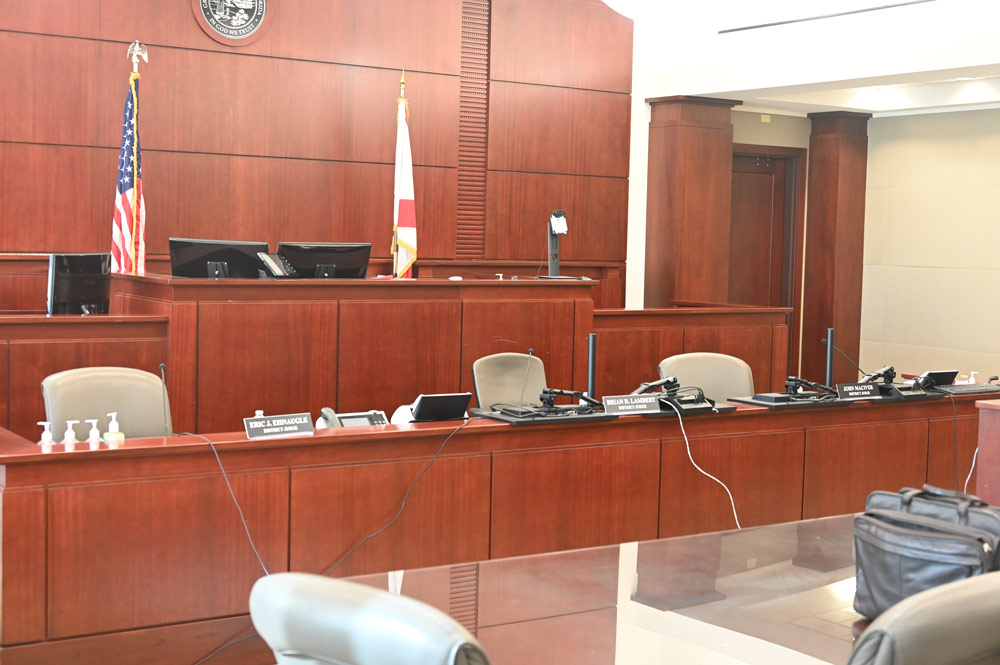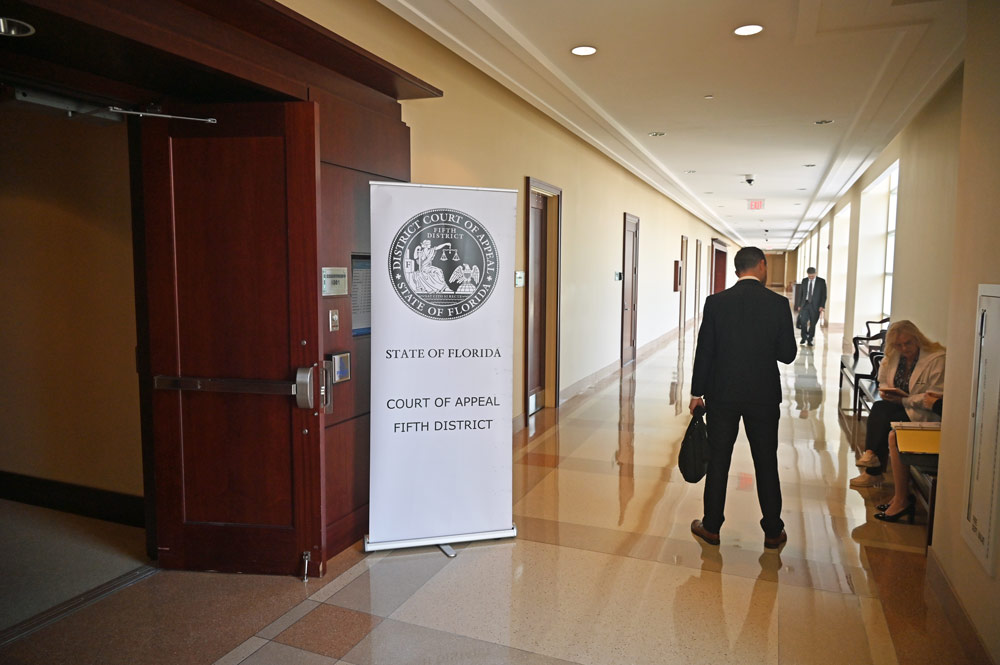
For the first time in recent memory, and perhaps ever, a panel of the Fifth District Court of Appeal held oral arguments at the Flagler County courthouse this morning, hearing three cases, none local.
“Glad to get out and visit with the counties within our district. We do this on a regular basis,” Presiding Judge Brian D. Lambert said just before the opening session. He could not recall a similar visit to Flagler in “at least the 11 years I’ve been here.” There are no ready records of the court ever sitting in Bunnell.
“As far as I know the District Court of appeals has never heard cases in Flagler. I may be mistaken though,” Clerk of Court Tom Bexley said. “The appeals process is an extremely important part of the court system in Florida and elsewhere. I think it’s a really cool touch for the court to convene in Flagler County. I’m sure they enjoy escaping their normal digs to visit other parts of their district. I hope they continue to explore alternate destinations for future hearings.”
Flagler County is part of the Seventh Judicial Circuit, which includes Volusia, Putnam and St. Johns counties. There are six appellate districts in the state. The Fifth District hears appeals from the fourth, fifth, seventh and eighteenth circuits, and a total of 14 counties. Its 12 judges break into three-judge panels to hear and decide cases. Occasionally, a case may be heard en banc, meaning that the entire court will hear it. But a case would have to warrant that importance.
A simple fold-out panel displaying the seal of Fifth District rose at the entrance to Courtroom 301 on the third floor of the courthouse this morning before 9, indicating the appeal court’s presence. Lawyers with cases to argue began walking in at 8:48. The judges, robed in black just like circuit judges, walked in at 8:58. Rather than a bailiff, Aaron Soltz, the Fifth District’s marshal, called the court to order.
Lambert sat between Judges Eric Eisnaugle to his right and John Maciver to his left. But for the marshal, they had no supporting staff. They did not preside from the elevated judge’s box–it would have been too small–but sat where the clerks usually sit, level with the lawyers arguing before them from barely a few feet away at a lectern. For a moment they looked more like three professors at a doctoral thesis defense than three appellate judges.
Lambert was clearly the humorist among them, saying they had to wait two minutes before going live at 9, for the “multimillion people watching.” (The court was ostensibly streaming the proceedings live through the Fifth District’s YouTube channel. In fact, no such stream appeared then or since.) During arguments, Lambert also invoked Osama bin Laden’s name in an odd analogy intended to be funny.
Rather than four or five Flagler County Sheriff’s bailiffs standing at strategic corners, as during felony court one floor up, the Fifth District had brought its own, just one, the only security it needed–if that–in a scarcely attended session. Students from Flagler County’s high schools, especially from Matanzas High School’s Justice Academy, had been expected. But someone at their school misjudged the occasion and thought it more important for the students to sit through their 97th test of the quarter than attend the only appeals court session most of them will ever see. (The so-called Florida Assessment of Student Thinking and a couple of end-of-course exams were scheduled in the district this morning.)
That left the gallery to the 10-odd lawyers who’d turned up for the three cases, and just one of the named defendants, Valerie Neal. Hers was the first case the judges heard, with Maitland attorney Laura L. Cepero arguing for Neal and Robert Bradford Jr. arguing for the state. Cepero hadn’t spoken 30 seconds before one judge, then another, began the rapid-fire questions.
It is a criminal case. It hinged on the meaning of “theft,” and whether the State Attorney’s Office had correctly charged Neal with grand theft.
An appeal does not re-litigate the case. It examines whether the case was tried correctly, whether the law was interpreted correctly and procedures followed accordingly. To the state, all those boxes were checked in Neal’s case. To the defense, she should never have been charged criminally, because nothing was stolen.
Neal, a 58-year-old Deltona resident, is the owner of a company called Wittle Fish. She’d worked for Cabinet Factory Outlet since November 2021, designing cabinets, measuring spaces and pricing the work for customers. At the same time, she sold cabinets of her own through her own company, Wittle Fish. The products had nothing to do with Cabinet Factory Outlet. In January 2010, a CFO staffer (the judges referred to the company by its acronym) found a check made out to Wittle Fish in a CFO bathroom. Neal had, in fact, been diverting customers to her company, promising them a shorter turnaround than the eight-to-10-week wait CFO was promising them.

She was charged with grand theft, tried, and found guilty by a jury in November 2023. She was sentenced to 29 days in jail and five years on probation. She appealed. Her probation is on hold as the appeal proceeds.
Today, Lambert and Maciver appeared skeptical of the state’s charge, favoring the defense at least judging by their questions’ direction. Eisnagle was more on the state’s side, at times opening doors for Bradford to walk through. The judge offered arguments in the faint outlines of a question, to which Bradford’s only answer could be “yes.”
“To be frank here, there wasn’t a crime here, perhaps a business dispute,” the defense’s Cepero told the court. The matter should have been dealt with in civil court, if at all. It did not belong in criminal court, she said. None of the facts of the case are in dispute–the checks, the steering of customers Neal’s way, though some of the customers writing checks out to Wittle Fish thought they were still dealing with CFO. But there were no thefts. No products belonging to CFO were diverted, Cepero argued.
If there were no thefts, there couldn’t be a grand theft charge. That was one of the judges’ very first questions to the state: “Did the state file the wrong charge?” Bradford didn;t think so. Theft, he said, encompasses all sorts of related acts–larcenies, misrepresentation, fraud, false pretenses.
Neal’s possible theft of time on CFO’s account was never mentioned, but alluded to, as when Eisnaugle, the judge who favored the state, asked the defense: “Wouldn’t your argument be far stronger had your client said: you can get a better deal with Wittle Fish, here’s my card, call me tonight?”
“She said that she told them that,” Cepero, but whether the customers were doing business with CFO or Wittle Fish, they were getting the very service they had worked out with Neal, and that service was not swiped from CFO’s product line.
But isn’t this “stealing the transaction as opposed to stealing the customer?” Eisnaugle asked.
No, Cepero replied. For a transaction to be stolen, there would have had to be a CFO transaction in the works. There wasn’t. Neal had shepherded her own transaction to Wittle Fish all along (if under CFO’s roof).
Lambert was momentarily skeptical. He offered up a scenario framed in a few quips. His wife is hounding him to build cabinets. He goes to buy the materials at Home Depot. The person at the checkout counter tells him to write out the check to a different entity than Home Depot. “I don’t care if I make this out to Osama bin Laden,” the judge said. He pays. “Have a nice day. I walk out of there” with the materials, and gets to work building the cabinets. “You’re telling me that Home Depot hasn’t lost anything?” he asked the defense lawyer.
Not the same thing, Cepero said: the Home Depot transaction involved actual products belonging to Home Depot. Neal was not taking anything from CFO. So she couldn’t possibly have met the elements of grand theft because there wasn’t property theft.
Maciver seized on that when it was the state’s turn to argue, and when Bradford appeared to overstep when he asked the court to look at the forest, not just the trees. It’s never a good idea to imply that the judges in front of you don’t have 20/20 vision. Maciver almost snapped: “I think we need to look at the elements,” he told Bradford. He then asked the attorney: “If it is interdicted before this transaction is completed, you have to tell us how this is CFO property.”
“It is, because it is in a CFO store,” Bradford said. It is, because that’s where customers were “going to do business, not to a Wittle Fish venue.
“Going to do business. To do business. Not have done business,” Maciver corrected.
Nevertheless, Neal was “undercutting” her employer to benefit her company. If an employee “can undo all that and take that money intended for the employer and take it for herself, if that’s not theft, we’re in trouble, every business in the state is in trouble,” Bradford said.
Not so, the defense attorney told the court. “There are civil remedies.” It wasn’t the most convincing rejoiner, although it went to the heart of the matter: if there was wrongdoing, it wasn’t criminal, in the defense’s view.
In any case, the little red light on he lectern had flashed its last. Time was up. The attorneys hurriedly collected their papers and walked out, ceding the way to the next case. It could be months before the court renders a decision. And at this rate, decades before it returns to Flagler County.
![]()





























Leave a Reply